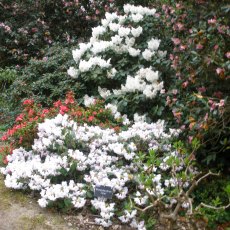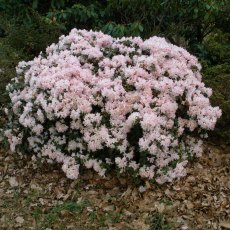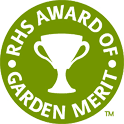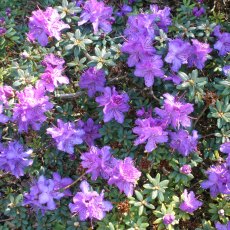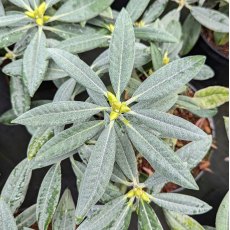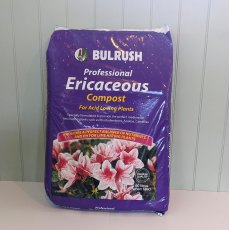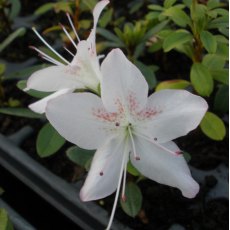Evergreen Azalea Madame van Hecke STANDARD
Item: DMAD
 Currently Unavailable
Currently Unavailable
May
Dark Pink
Not Scented
No
To -20 °C
Collect in Store
This item is available for collection.
Home Delivery
UK mainland delivery from £8.95
A popular and reliable stunning profusion of small bright pink flowers. Flowering in early May, this is a very tough and easy growing plant that has an upright habit.
These Standards have a clear stem of approximately 40cm, with a nice colourful head measuring approximately 15-20cm now. You can expect the head to measure 60-80cm in 10 years. The stem should always be supported with a cane or small stake. Ideal for containers, but always choose a wide pot to aide stability.
Registered as Madame Albert van Hecke.
- Ideal for containers and small gardens.
- Easy to grow.
- Group:Evergreen Azalea (kaempferi hybrid).
- Parentage: 'Willy' X unknown.
- Hybridization date: pre 2000 (1960).
- Bred by: A van Hecke. Origin: Belgian.
- Habit: Upright.
- Ideal position: Most garden situations.
- Ideal soil: pH 4.5 to 6.
- RHS Hardiness Rating: H7.
- How we usually propagate this plant: Cutting.
Customer Reviews

Good to know
Standards
Standard Rhododendrons (grown on a stem) were popular during the first half of the twentieth century, and are now finding renewed interest as they help to provide a variety of flowering heights and interest within the garden. We grow a limited range of rhododendrons and azaleas as standards, grown on a single straight stem. These are ideal for patio pots or formal situations (and better looking than a Bay tree!).
Please note: Standards require a good stake throughout their life to prevent wind damage. Taller standards are suitable for growing in the ground, but only short standards should be grown in pots to avoid being blown over in high winds. Standards such as evergreen azaleas can suffer in cold winters as the stems are more exposed than usual. Consider the use of pipe insulation on the stems in times of hard winters.
If growing in containers, repot into a slightly larger pot every 3 years, using a good ericaceous compost.
The Basics
Ideal soil
Acidic soil, good organic content, pH 4.5-6.0. Inkarho range of rhododendrons will tolerate soils up to pH7.5
Sun or Shade
Light dappled shade is best for most varieties.
Shelter
Refer to hardiness rating. Give young plants protection.
Site Selection
Avoid close to trees, roots, invasive weeds, walls, hot patios, dry banks and waterlogged soils. Do not use weed matting or stone mulch.
Plant spacing
Use the height shown in 10 years as a guide to the distance between each plant. Allow room for plant to fill out. If planting closer for instant impact, be prepared to move plants after a few years.
Compost
- 3 litre pot, dig in 10-20 litres of ericaceous compost.
- 7.5 litre pot, dig in 20-30 litres of ericaceous compost.
- 70-80cm specimen, dig in 60 litres of ericaceous compost.
- 100-120cm specimen, dig in 120 litres of ericaceous compost.
Planting depth
Plant high in the ground, with the top of the rootball visible.
Feeding
Slow-release ericaceous feed recommended in March and straight after flowering.
Mulch
Recommended every few years.
Water
The key ingredient! Keep moist all season, especially the critical time at end of June for flower bud initiation. Tap water is better than no water. Heavy dose at least once per week in dry weather.
Drainage
Ensure good drainage in winter, especially with yellow flowering varieties. Avoid waterlogged sites.
Pruning
Rhododendrons and Camellias: Not normally required. Tidy wayward shoots after flowering.
Evergreen azaleas and Bloombux can be clipped into a low hedge.
Magnolias and Acers: Formative pruning when young to shape into a tree or bush.
Deadheading
Remove old flower-heads, particularly on young or weak plants.
For further advice see here
Size Guide
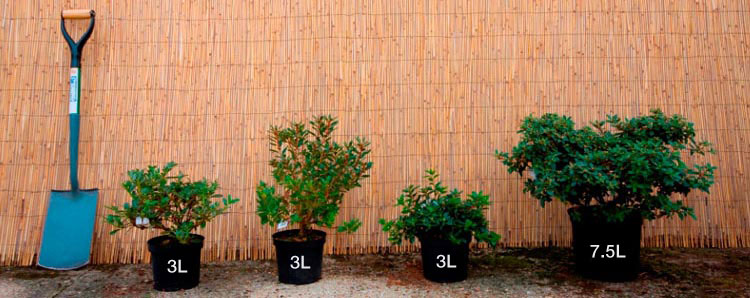
Delivery & Returns
Our website calculates the delivery charge according to weight and delivery location throughout the UK. To see these charges, please enter your postcode at the checkout, and you will see the charge vary as you add more items to your wheelbarrow.
 Millais Nurseries
Millais Nurseries





